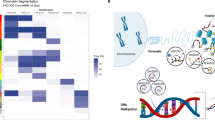Abstract
Human DNA fragments, as well as whole colonocytes, can be found in stool and interrogated for mutations associated with carcinogenesis. Multiplexed panels of point mutations in fecal DNA improved the sensitivity of cancer detection (51.6%; 95% CI, 34.8%–68%) compared with fecal occult blood testing (12.9%; 95% CI, 5.1–28.9). However, the multiplex panels are not more sensitive than fecal occult blood testing in detecting advanced adenomas. Markers of epigenetic events, such as DNA methylation of gene promoters in genes not previously known to be associated with carcinogenesis or colorectal cancer, have recently been shown to be potential markers for early detection. Future approaches to improve sensitivity of fecal DNA detection of colorectal adenocarcinoma may require the inclusion of epigenetic biomarkers, the use of colonocytes isolated from feces, or both.
Similar content being viewed by others
References and Recommended Reading
American Cancer Society: Cancer Facts & Figures 2007. Atlanta: American Cancer Society; 2007.
Coughlin SS, Thompson TD, Seeff L, et al.: Breast, cervical, and colorectal carcinoma screening in a demographically defined region of the southern U.S. Cancer 2002, 95:2211–2222.
Sirovich BE, Schwartz LM, Woloshin S: Screening men for prostate and colorectal cancer in the United States: Does practice reflect the evidence? JAMA 2003, 289:1414–1420.
Guide to Clinical Preventive Services, 2006: Recommendations of the U.S. Preventive Services Task Force. AHRQ Publication No. 06-0588. Rockville, MD: Agency for Healthcare Research and Quality; 2006.
Smith RA, von Eschenbach AC, Wender R, et al.: American Cancer Society Guidelines on Screening and Surveillance for the Early Detection of Adenomatous Polyps and Colorectal Cancer. Atlanta: American Cancer Society; 2001.
Vijan S, Inadomi J, Hayward RA, et al.: Projections of demand and capacity for colonoscopy related to increasing rates of colorectal cancer screening in the United States. Aliment Pharmacol Ther 2004, 20:507–515.
Winawer S, Fletcher R, Rex D, et al.: Colorectal cancer screening and surveillance: clinical guidelines and rationale—update based on new evidence. Gastroenterology 2003, 124:544–560.
Lieberman DA, Weiss DG, Bond JH, et al.: Use of colonoscopy to screen asymptomatic adults for colorectal cancer. Veterans Affairs Cooperative Study Group 380. N Engl J Med 2000, 343:162–168.
Davies RJ, Miller R, Coleman N: Colorectal cancer screening: prospects for molecular stool analysis. Nat Rev Cancer 2005, 5:199–209.
Wu GH, Wang YM, Yen AM, et al.: Cost-effectiveness analysis of colorectal cancer screening with stool DNA testing in intermediate-incidence countries. BMC Cancer 2006, 6:136.
Rex DK, Rahmani EY, Haseman JH, et al.: Relative sensitivity of colonoscopy and barium enema for detection of colorectal cancer in clinical practice. Gastroenterology 1997, 112:17–23.
Osborn NK, Ahlquist DA: Stool screening for colorectal cancer: molecular approaches. Gastroenterology 2005, 128:192–206.
Berger BM, Schroy PC 3rd, Rosenberg JL, et al.: Colorectal cancer screening using stool DNA analysis in clinical practice: early clinical experience with respect to patient acceptance and colonoscopic follow-up of abnormal tests. Clin Colorectal Cancer 2006, 5,:338–343.
Eastwood GL: Gastrointestinal epithelial renewal. Gastroenterology 1977, 72:962–975.
Barkla DH, Gibson PR: The fate of epithelial cells in the human large intestine. Pathology 1999, 31:230–238.
Hood JD, Cheresh DA: Role of integrins in cell invasion and migration. Nat Rev Cancer 2002, 2:91–100.
Sidransky D, Tokino T, Hamilton SR, et al.: Identification of ras oncogene mutations in the stool of patients with curable colorectal tumors. Science 1992, 256:102–105.
Matsushita H, Matsumura Y, Moriya Y, et al.: A new method for isolating colonocytes from naturally evacuated feces and its clinical application to colorectal cancer diagnosis. Gastroenterology 2005, 129:1918–1927.
Davidson LA, Lupton JR, Miskovsky E, et al.: Quantification of human intestinal gene expression profiles using exfoliated colonocytes: a pilot study. Biomarkers 2003, 8:51–61.
Eguchi S, Kohara N, Komuta K, Kanematsu T: Mutations of the p53 gene in the stool of patients with resectable colorectal cancer. Cancer 1996, 77:1707–1710.
Traverso G, Shuber A, Levin B, et al.: Detection of APC mutations in fecal DNA from patients with colorectal tumors. N Engl J Med 2002, 346:311–320.
Vogelstein B, Kinzler KW: Digital PCR. Proc Natl Acad Sci U S A 1999, 96:9236–9241.
Dong SM, Traverso G, Johnson C, et al.: Detecting colorectal cancer in stool with the use of multiple genetic targets. J Natl Cancer Inst 2001, 93:858–865.
Ahlquist DA, Skoletsky JE, Boynton KA, et al.: Colorectal cancer screening by detection of altered human DNA in stool: feasibility of a multitarget assay panel. Gastroenterology 2000, 119:1219–1227.
Tagore KS, Lawson MJ, Yucaitis JA, et al.: Sensitivity and specificity of a stool DNA multitarget assay panel for the detection of advanced colorectal neoplasia. Clin Colorectal Cancer 2003, 3:47–53.
Syngal S, Stoffel E, Chung D, et al.: Detection of stool DNA mutations before and after treatment of colorectal neoplasia. Cancer 2006, 106:277–283.
Imperiale TF, Ransohoff DF, Itzkowitz SH, et al.: Fecal DNA versus fecal occult blood for colorectal-cancer screening in an average-risk population. N Engl J Med 2004. 351:2704–2714.
Fearon ER, Vogelstein B: A genetic model for colorectal tumorigenesis. Cell 1990, 61:759–767.
Song K, Fendrick AM, Ladabaum U: Fecal DNA testing compared with conventional colorectal cancer screening methods: a decision analysis. Gastroenterology 2004, 126:1270–1279.
Brenner DE, Rennert G: Fecal DNA biomarkers for the detection of colorectal neoplasia: attractive, but is it feasible? J Natl Cancer Inst 2005, 97:1107–1109.
Petko Z, Ghiassi M, Shuber A, et al.: Aberrantly methylated CDKN2A, MGMT, and MLH1 in colon polyps and in fecal DNA from patients with colorectal polyps. Clin Cancer Res 2005. 11:1203–1209.
Chen WD, Han ZJ, Skoletsky J, et al.: Detection in fecal DNA of colon cancer-specific methylation of the nonexpressed vimentin gene. J Natl Cancer Inst 2005, 97:1124–1132.
Samuels Y, Wang Z, Bardelli A, et al.: High frequency of mutations of the PIK3CA gene in human cancers. Science 2004, 304:554.
Author information
Authors and Affiliations
Corresponding author
Rights and permissions
About this article
Cite this article
Turgeon, D.K., Brenner, D.E. Fecal DNA-based detection of colorectal neoplasia. Curr colorectal cancer rep 3, 171–177 (2007). https://doi.org/10.1007/s11888-007-0027-1
Published:
Issue Date:
DOI: https://doi.org/10.1007/s11888-007-0027-1




